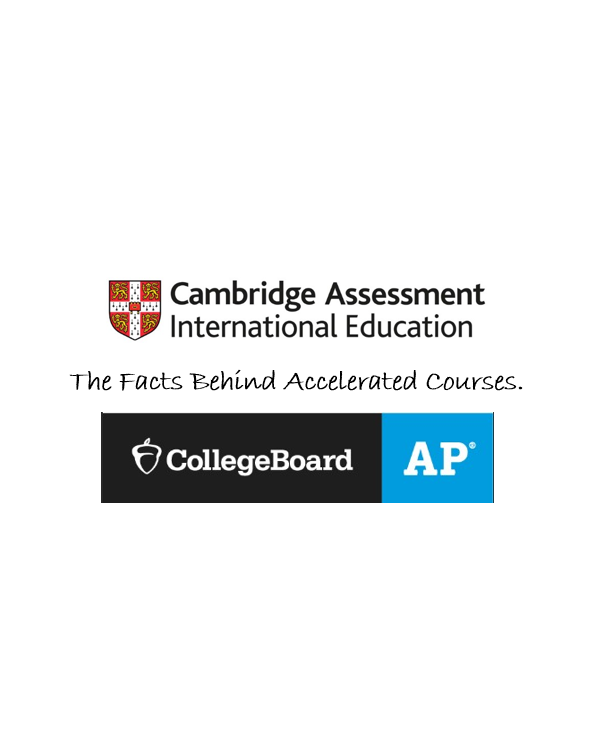Accelerated courses originate from one of these groups: Advanced Placement(AP), Cambridge(AICE), Dual Enrollment(HCC/USF).
AP courses are born from College Board (USA)
AICE courses are born from Cambridge (England)
Dual Enrollment courses are born from a college or university
Weighted GPA – All 3, (AP, AICE, DE) are weighted the same: A = 5.00 (Honors A=4.50, Academic A=4.00)
Class Difficulty Level Classifications: Academic (typical reading levels 1 & 2 – some exceptions occur in elective classes where levels 1-5 are appropriate) – Honors (typical reading level 3) – AP/AICE/DE (typical reading levels 4 & 5)
Exam – The end-of-year exam does NOT affect the transcript grade for the course. The exam score is private unless you share it with a university or any other organization. Essentially, the exam is risk-free to take. The goal is to score high enough to submit for college credit. Not passing an exam is NOT a reason to stop taking accelerated courses.
Student Resume - It is important to build your resume for college applications. The more accelerated courses on your transcript, the higher the ranking you will receive in the university’s algorithm for admission. Colleges & universities want to accept students who have the most exposure to college rigor possible. This minimizes their risk in students failing.
College Success - Students who take 1 or more AP/AICE/DE courses are significantly more likely to graduate from college in 4 years than students who do not take accelerated courses.
Students who score a 1 or 2 out of 5 on accelerated exams are more likely to attend college and perform better than academically similar students who did not take accelerated course(s). For example, students with an average accelerated exam score of 2 had a 75% probability of enrolling in a 4-year college compared to 56% for similar non-accelerated students.
Underrepresented students (Black, Hispanic, low-income etc) who score 3 or higher on accelerated exams are more likely to graduate from college within 5 years compared to their non-accelerated peers.
College Credit – Every State university and most all private universities will give college credit for accelerated courses. To determine how much college credit and for which specific course the credit is given is determined by each school. Reference their website to determine actual score requirements for each exam. The more college credit a student earns in high school, the more money saved at college. Also the student has additional opportunities to double major or explore additional classes.
Florida Bright Futures Scholarship
100% Award Level Florida Academic Scholars
3 Pathways
1. 3.5 weighted GPA, SAT 1330 – ACT 29 – CLT 95 qualifying score by Aug 31 of your high school graduation year, 100 community service hours or paid work hours or combination of the two.
2. AICE Diploma – Complete 7 AICE courses and pass course exams. No SAT/ACT/CLT test or GPA requirement. 100 community service hours or paid work hours or combination of the two.
3. AP Capstone Diploma – Complete AP Seminar & AP Research + 4 AP courses of your choice and pass each course exam. No SAT/ACT/CLT test or GPA requirement. 100 community service hours or paid work hours or combination of the two.
75% Award Level Florida Medallion Scholars
1 Pathway
1. ...3.0 weighted, SAT 1190 – ACT 24 – CLT 82 qualifying score by Aug 31 of your high school graduation year, 75 hours of community service hours or 100 hours of paid work or combination of the two equaling 100 hours.

